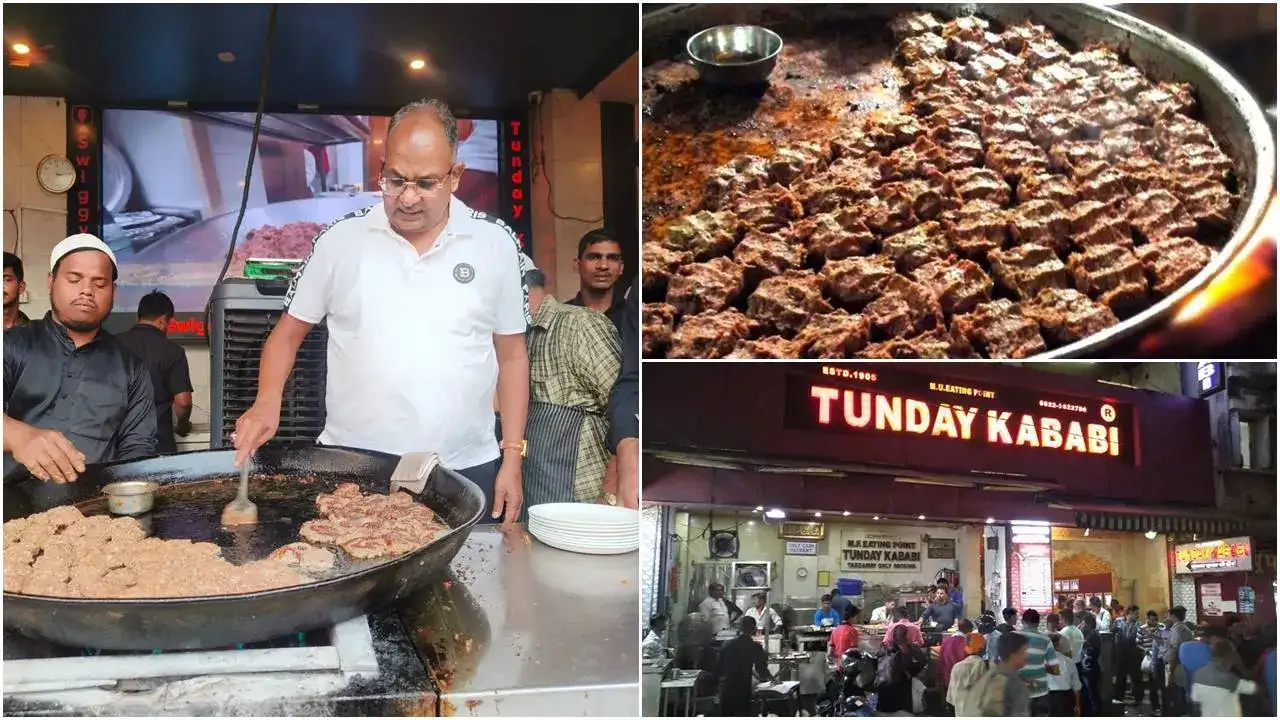Copyright timesnownews

I’ve spent twenty-five years of my life in Lucknow — a city wrapped in the fragrance of kebabs, kebabs, and more kebabs. Growing up here, I took for granted the things that visitors raved about: the domes and minarets, the tehzeeb that shaped our speech, and the food that could make anyone weak in the knees. To me, it was just home — until I moved away. It was only then that I realised Lucknow isn’t just about its grand monuments or its genteel charm; it’s about flavours that carry history in every bite. And if there’s one place that captures the essence of that heritage, it’s Tunday Kababi — a name that has become synonymous with the city itself. Recently, I had the privilege of sitting down with Mohammad Usman, the soft-spoken yet deeply passionate heir to this 120-year-old culinary institution. The son of Haji Rais Ahmad and the grandson of the original “Tunday”, Usman now carries the legacy of one of India’s most celebrated food stories — one that began with just twelve kebabs and a man with one hand who changed the course of Lucknow’s gastronomic destiny. A Legacy Born in 1905 “It started in 1905,” Usman begins, his eyes lighting up with unmistakable pride. “My grandfather, the original Tunday, began the business with just a dozen kebabs. He didn’t have one hand — that’s how the name Tunday Kababi came about. What began as a humble stall soon became part of Lucknow’s identity.” There’s poetry in that story — a man with one hand crafting kebabs so soft they melt before you even chew. The image feels almost mythical, like something out of a folktale passed down through generations. But for Lucknow, it’s not just legend; it’s living history. What fascinates me most is how the Tunday legacy isn’t built on grandeur or marketing, but on consistency — the kind of devotion that transforms a small street stall into an institution of faith. “Even today,” Usman says, “people come to us and say, ‘The taste is the same as what my grandfather remembered.’ That’s what we hold sacred — that continuity.” Secrets That Stay in the Family The moment I bring up the question that every food lover has — what’s the secret behind the galawati kebab — Usman laughs softly, as though he’s heard it a thousand times before. “The recipe hasn’t changed,” he says. “It’s the same one my grandfather created. The spices we use are sourced carefully, sometimes even from abroad. They’re cooked in a way that’s good for digestion. You won’t get acidity even if you eat a dozen kebabs.” He laughs again when I raise an eyebrow, half in disbelief. “Try it yourself,” he insists. “You’ll see.” That promise alone says everything about the confidence and faith in a recipe that has survived empires, wars, and waves of modernisation. The blend of spices — rumoured to contain over a hundred ingredients — remains one of India’s best-kept culinary secrets. Only a handful within the family know the exact mix. “It’s a blessing from God,” Usman adds. “We pray that the taste stays the same. Even today, I keep testing, tasting, and making sure nothing changes. Our customers trust us for that consistency.” That trust, built over more than a century, is what defines Tunday Kababi. It’s not just about the food; it’s about an unspoken promise between the maker and the eater — a promise of memory, comfort, and belonging. From Hand-Cut Kebabs to a New Era As the conversation flows, Usman takes me back to a time before machines and modern conveniences — when everything was done by hand. “Earlier, kebab meat was minced by hand,” he recalls. “Now we use machines. It’s a new era, and we have to adapt. But the essence remains the same.” That statement carries weight. In a world obsessed with speed and quantity, Tunday’s refusal to compromise on quality feels revolutionary. “We haven’t given out any franchises,” he says firmly. “We keep a close eye on the quality at every outlet. There are others in Noida and Delhi using our name, but they’re not connected to us. They can’t maintain our standards — and that’s what sets us apart.” It’s this fierce guardianship of quality that has kept the brand authentic even as it expands beyond Lucknow’s boundaries. In an era when most legacy food brands have diluted their essence in the name of scale, Tunday Kababi continues to remain a family-run operation, guided by care, not commerce. The City of Nawabs and Flavours As we talk about the past, the conversation naturally turns to Lucknow’s royal legacy. Usman smiles, his eyes glinting with nostalgia. “In the days of the Nawabs,” he explains, “Lucknow and Hyderabad were known for their food. The Nawabs were very particular about flavour. Even today, the spices are adjusted according to the season. That’s the science behind the art.” That line lingers in my head — the science behind the art. It perfectly captures the balance that makes Lucknow’s cuisine so unique: the sophistication of science blended seamlessly with the elegance of tradition. Every kebab at Tunday feels like a mathematical equation solved with feeling. “We take care,” Usman says, “so that every bite feels the same, whether you eat it today or twenty years from now.” It’s a kind of culinary discipline that borders on devotion. You taste it in the tenderness of the meat, in the whisper of saffron and cardamom, in the way the kebab simply dissolves — not in your mouth, but in your memory. More Than Just Kebabs Of course, Tunday Kababi isn’t just about the galawati kebab. Usman lists the other offerings with pride: “We also serve mutton and chicken biryanis, malai tikkas, fish tikkas, and buffalo boti kebabs. But the kebab — that’s emotion. People from Lucknow, wherever they go, feel connected to it.” And he’s right. There’s something almost spiritual about that connection. For most Lucknowites, biting into a Tunday kebab isn’t merely eating — it’s an act of remembrance. It’s childhood Sundays, it’s late-night drives to Aminabad, it’s the smell of ghee and cloves mingling with winter air. It’s also the soundscape — the clang of tongs, the sizzle of fat on the griddle, the sing-song calls of waiters shouting orders across the room. There’s no pretense here, no fine-dining drama. Just pure, unfiltered food that speaks the language of love. The Wall of Fame and the Heart of Lucknow At the Aminabad outlet — the heart and soul of Tunday Kababi — the entrance is dominated by what locals lovingly call the “wall of fame.” Photographs of Mohammad Usman with some of India’s most beloved stars — from the late Dilip Kumar to Salman Khan, Shah Rukh Khan, and Aamir Khan — line the walls. “It’s nice to see people from everywhere come here,” Usman says with a modest shrug. “But what really makes me happy is when people tell me they came here because their parents or grandparents told them to.” That’s the true measure of legacy — when a dish becomes a rite of passage, a story passed from one generation to the next. The Pride of Lucknow Before we part, I tell Usman how proud I feel — of the city, the food, and the culture I once overlooked. He smiles, his hands folding together in quiet humility. “It’s all a blessing,” he says softly. “We just want people to be happy. That’s our only aim.” As I step out into the crowded lanes of Aminabad, the evening air hangs heavy with the scent of grilled meat, saffron, and nostalgia. The signboard of Tunday Kababi glows faintly in the twilight, and somewhere in that golden light, I see more than a restaurant. I see history — alive, fragrant, and still cooking. Lucknow, I realise, isn’t just a city. It’s a mood. It’s tehzeeb in the form of flavour. And at its heart, beating steady for over a century, is a kebab made by a one-handed man who taught us that true craftsmanship isn’t about perfection — it’s about passion. As I walk away, the taste of that melt-in-the-mouth kebab lingers — soft, smoky, almost poetic. A bite of history. A taste of home.



